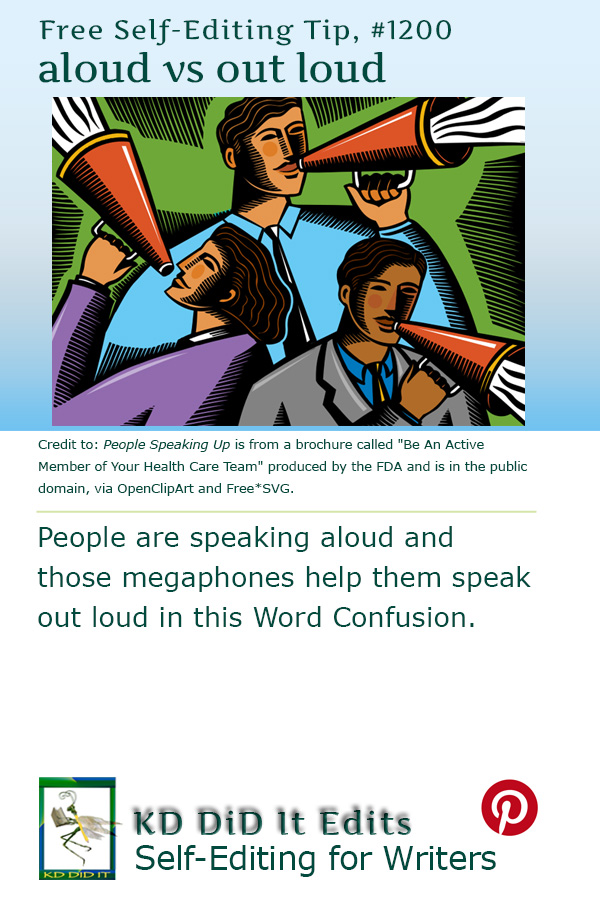I was curious when I ran across this word confusion aloud vs out loud. It simply felt wrong to say that “she cried aloud”.
Both aloud and out loud mean so that other people can hear, but that out loud in the example above would have been slightly better — some dictionaries prefer out loud for a sudden outburst.
Aloud is to talk loud enough to be heard — above a whisper, to say something.
Out loud is to talk loudly in a sudden burst, to cry or to scream connoting something involuntary or inappropriate.
Exploring Later . . .
You may want to explore “Allowed versus Aloud“.
Word Confusions . . .
. . . started as my way of dealing with a professional frustration with properly spelled words that were out of context in manuscripts I was editing as well as books I was reviewing. It evolved into a sharing of information with y’all. I’m hoping you’ll share with us words that have been a bête noire for you from either end.
If you found this post on “Aloud versus Out Loud” interesting, consider subscribing to KD Did It, if you’d like to track this post for future updates.
| Aloud | Out Loud |
|---|---|
 |
 — |
| Part of Grammar: | |
| Adjective, postpositive; Adverb | Adverbial phrase |
| Adjective, postpositive: [British] In a normal voice
[British] In a spoken voice
[Archaic] In a loud voice Adverb:
[Archaic] Loudly
|
Adverbial phrase: [Commonly paired with the verb to blurt] Loud enough to be heard without restraint |
| Examples: | |
| Adjective, postpositive: He read aloud to the children. He was thinking aloud about what to do next. They cried aloud in sorrow. Adverb: She was crying aloud for help. He read the letter aloud. |
Adverbial phrase: He didn’t raise his hand but instead blurted the answer out loud. After reading the joke, he could not help but laugh out loud. He was thinking out loud about what to do next. They asked me to read out loud but I was too nervous. I didn’t notice I was thinking out loud until Deon pointed it out. Please read the instructions out loud. |
| History of the Word: | |
| Middle English from a combination of Old English a- (unstressed form of on expressing manner) + Old English hlūd, which is of West Germanic origin and related to the Dutch luid, the German laut, from an Indo-European root meaning hear, shared by the Greek kluein meaning hear, klutos meaning famous and the Latin cluere meaning be famous. | First came onto the scene in 1821 as a colloquialism for aloud. |
C’mon, get it out of your system, bitch, whine, moan . . . which words are your pet peeves? Also, please note that I try to be as accurate as I can, but mistakes happen or I miss something. Email me if you find errors, so I can fix them . . . and we’ll all benefit!
Satisfy your curiosity about other Word Confusions on its homepage or more generally explore the index of self-editing posts. You may also want to explore Book Layout & Formatting Ideas, Formatting Tips, Grammar Explanations, Linguistics, Publishing Tips, the Properly Punctuated, Writing Ideas and Resources, and Working Your Website.
Resources for Aloud versus Out Loud
“Aloud vs. Out Loud: What’s the Difference?” Writing Explained. n.d. Accessed 14 Aug 2023. <https://writingexplained.org/aloud-vs-out-loud-difference>.
Apple Dictionary.com
Collins Dictionary: aloud
Dictionary.com: aloud
The Editors of Encyclopædia Britannica. “Transition: Atomic Physics.” Encyclopædia Britannica. n.d. Web. 15 May 2020. <https://www.britannica.com/science/transition-atomic-physics>.
The Free Dictionary: aloud
Gina. “Are You Thinking ‘Aloud’ or ‘Out Loud’?” Insights by LanguageTool. n.d. Accessed 14 Aug 2023. <https://languagetool.org/insights/post/word-choice-aloud-or-out-loud/>.
Lexico.com: aloud
Pinterest Photo Credits
People Speaking Up is from a brochure called “Be An Active Member of Your Health Care Team” produced by the FDA and is in the public domain, via OpenClipArt and Free*SVG.


